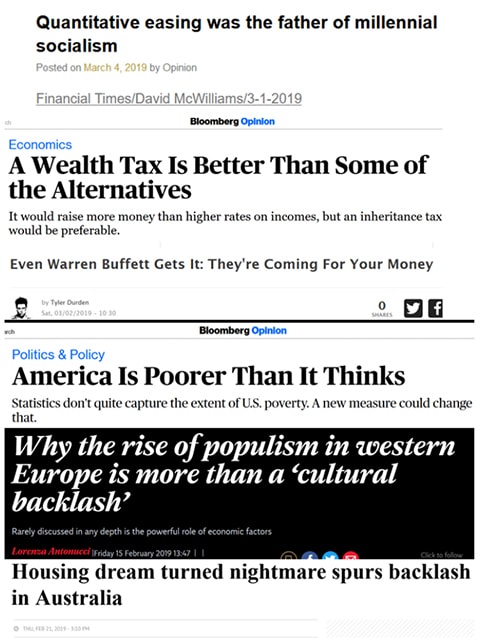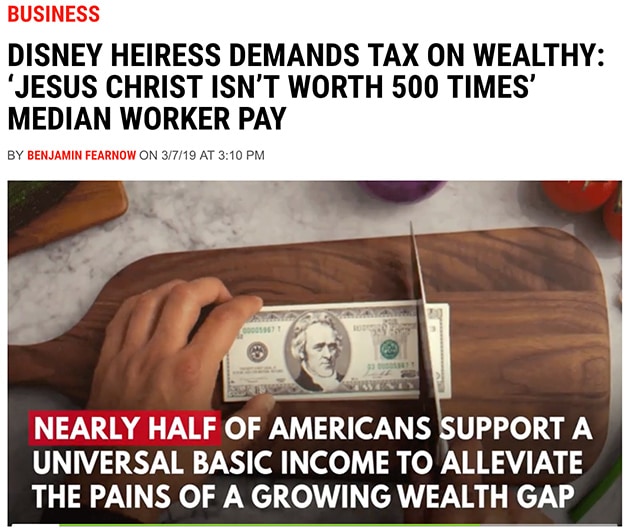2005 to 2019 – An Obsession with Plutonomy
International Women’s Day came round and our favourite picture was posted by CNBC’s Kayla Tausche on Twitter last month on the US-China trade talks, commenting, “There are only two women at the table for US-China trade talks. They are the interpreters.”
Yes… can we just agree to add that photo to the growing list of global problems?
Because the hot topic of the month is not an impending recession, or the on-and-off trade war, or Brexit, or corrupt and mad dictators or crumbling central banks (Mario Draghi) who talk about walking in the dark after a decade of negative interest rates, but the emergence of a disturbing socialist skew in the last bastion of democracy in the world, the US.
“Some 51% of Americans aged 18-29 have a positive view of socialism”, according to a Gallup poll mentioned in The Economist last month.
 Source: The Economist
Source: The Economist
Maybe you will have not noticed a thing, but the pieces of the puzzle are starting to fall into place for us, linking the 17th Saturday of Yellow Vest protests in France to the ambitions of Green New Deal (complete with 70% income tax), championed by millennial Democrat, Alexandria Ocasio-Cortez, all the way back to the days of Occupy Wallstreet, the Arab Spring and the populist leaders that have come along so far, promising a more equitable and inclusive society. But it’s starting to look like power-hungry dictators as the world has devolved into a less democratic place since 2012.
It’s Happening as They Said in 2005
There is a lot to digest and a ton of opinions and commentaries churned out on a daily basis but we feel that it is just part of the story. We have 3 Citibank global strategists in 2005 to thank for our enlightenment because we have been fans of the Plutonomy concept for a near decade, now, avidly documenting events as they unfurl and continue to develop to come to this point.
 Collage of random daily headlines
Collage of random daily headlines
It is Plutonomy, a clever word coined by, then Citi strategists, Ajay Kapur, Niall Macleod and Narendra Singh, all of whom we do not have the pleasure of being acquainted with other than our dusty old copy of their report, Plutonomy: Buying Luxury, Explaining Global Imbalances that we chanced upon years after it was written and after they moved on.
Plutonomy is a situation where economic growth is powered and consumed by the wealthiest upper class of society. Plutonomy refers to a society where the majority of the wealth is controlled by an ever-shrinking minority; as such, the economic growth of that society becomes dependent on the fortunes of that same wealthy minority.
By merging plutocracy, defined as a government by the rich or wealthy class, with the economy, we end up with an economy controlled by a wealthy minority and the world has seen plutonomies for the past millennium, most recent being the Roaring Twenties in the US.
The drivers of plutonomies the report identified in 2005, which are not difficult at all to relate to now in 2019, are as follows.
1. Disruptive technology-driven productivity gains
2. Creative financial innovation
3. Capitalist-friendly cooperative governments and tax regimes
4. Globalisation that re-arranges global supply chains with mobile rich elites and immigrants
5. The rule of law
6. Patenting inventions
It does feel like we have come a full circle here, and there are very few people in the world who would disagree at this moment that things have got quite out of hand and the world has woken up to the effects of an economy where asset prices rise much faster than wages and the average person falls behind (and the young millennials tend to be, on average, more asset-poor).
FT blames it squarely on central bankers, that quantitative easing was the father of millennial socialism, leaving the younger millennials a “fragile stake in the society they are supposed to build”.
Is it not just point number 3 above, extending governments to include central banks, unwilling to risk the capitalism model and driving asset prices higher with negative rates, saving jobs but exacerbating wealth inequality in the process?
What about disruptive technology?
No one has been spared as far as disruptive technology is concerned and it continues to plague the economy and society with planned store closures in 2019 rising to 4,500 so far in the U.S., and the over hundred thousand bank branch closures in Europe over the past decade.
At the same time, the world has come to embrace corporate executives as the new aristocrats of power, with celebrity status to even dally with electoral politics, such as Donald Trump and the billionaire boys club, singing a populist anthem to weary masses but mostly looking after themselves.
The Beauty and Death of Plutonomy
The beauty of plutonomies is that they happen and they are not bad and we can even say capitalism encourages entrepreneurship.
How do we know it is getting out of hand?
When millennials embrace the ideals of socialism, when we have the majority supporting a wealth tax, when billionaires like Warren Buffet, suggest they get taxed more and when Walt Disney’s heiress comes out to say that “Jesus Christ himself isn’t worth 500 times his median workers’ pay.”
 Source: Newsweek
Source: Newsweek
For the U.S., the signs have been glaring at us as we wrote last year in Debt and the Wealth Gap—A Recipe for Disaster, how “our heads grapple with the fact that America is minting more millionaires than ever when nearly 80% of Americans have less than $100,000 net worth and 30% of households have no wealth which is plausible given that half of Walmart’s 2.3 million workers make less than $19,177 in wages and we realise why the rush to get rich, asap, because 2 in 5 Americans polled in a Federal Reserve survey, do not have enough savings to cover a $400 emergency expense”.
As a global trend, between 2009 and 2017, the number of billionaires it took to equal the wealth of the world’s poorest 50 per cent fell from 380 to 42.
Our favourite 2005 report stipulated, “At the heart of plutonomy, is income inequality. Societies that are willing to tolerate/endorse income inequality, are willing to tolerate/endorse plutonomy.”
We summarise from the report when plutonomies die and backlashes to expect.
1. Organised societies have 2 ways of expropriating wealth—revocation of property rights or through the tax system or changing rules that affect the balance of power between labour and capital (includes protectionism). In other words, a change of heart by governments.
2. Labour backlash—“low-end developed market labour might not have much economic power, but it does have equal voting power with the rich”. Protectionism and anti-immigration will result.
3. Social backlash—societies allow plutonomy when enough of the electorate believe they have a chance of becoming a Pluto-participant… the embodiment of the “American dream”. But if voters feel they cannot participate, they are more likely to divide up the wealth pie, rather than aspire to be truly rich.”
4. Another social backlash comes to visit “Robber-baron” economies (post-Civil War America). “The population at large might still endorse the concept of plutonomy but feel they have lost out to unfair rules.”
In 2005, it was observed that the established plutonomies of the U.S., U.K, and Canada will be buffeted by the “emerging market entrepreneur/plutocrats (Russian oligarchs, Chinese real estate/manufacturing tycoons, Indian software moguls, Latin American oil/agriculture barons), benefiting disproportionately from globalization are logically diversifying into the asset markets of the developed plutonomies. They are attracted by the facets that facilitated the re-emergence of plutonomies in the U.S., UK, and Canada—technology, internationalism, the rule of law, financial innovation and capitalist-friendly cooperative governments.”
Fast Forward 2019—Plutonomy’s Cover Blown
As we said for 2017, 5 million is the new 1 million when most folks were up 30% on their portfolios that year.
“It takes $5 mio to open a basic private bank account in 2017 when it used to take just $1 mio. It does not take a lot of logic to figure that going from zero to $5 mio is a lot harder than zero to $1 mio for the folks who are starting from scratch unless… they put $25,000 into Ripple at the start of 2017 to give them $5,000,000 on 20,000% returns.”, and that means many have fallen behind, especially those who depend on their regular wages to get there.
Are we surprised that U.S. millennials support socialist ideals?
They have given up because it is too hard to bridge the gap and get rich.
No, we are not worried the least because the last time we checked, it is still Democrats versus Republicans.
Yet we shudder, because socialism depends on the “faith in the incorruptibility of collective action”, as highlighted by the Economist op-ed and we saw what socialism did to Venezuela when the chap Chavez fell to corruption.
Nonetheless, it does look like Plutonomy’s cover has been blown and while pitchforks are unlikely, governments will be racing to make amends just like France’s 5% digital tax on 30 Internet giants and social media clampdowns in China.
As for all those luxury goods and services stocks we were told to buy for Plutonomy’s sake in 2005, the Julius Baer, Bulgari, Burberry, Richemont, Kuoni, and Toll Brothers (golly, Prada was not even listed then), perhaps to steer clear of?
A Final Word on Our Obsession with Plutonomy
For years, we have been watching and patiently documenting, noticing voices grow louder as discontentment and stress levels grew, billionaires getting worried and the opiod crisis spiralling out of proportions in the West, possibly due to youth disenchantment.
What will come out of this now that Plutonomy’s cover has been blown?
We would not know but it would not be good even for small fry former bankers if the pitchforks do come out, heaven forbid.
We can see increasing demand for Singapore passports for wealthy migrants looking for a haven, as we write with semi-cooked brains in the sweltering heat, drinking more water and thinking of Hyflux and how the SIAS is requesting the presumably richer senior Hyflux bondholders to waive their share and take the same payout as retail perpetual bondholders, rewriting the law in the process.
It looks like our obsession with Plutonomy is coming to an end. It’s been fun while it lasted. So long and thanks for all the fish?



